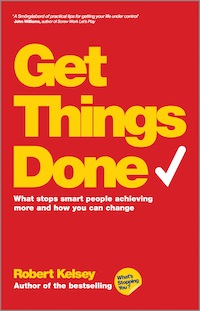What separates life’s achievers from those stuck on the starting grid? Bestselling Robert Kelsey, author of new book Get Things Done: What Stops Smart People Achieving More and How You Can Change (£10, amazon.co.uk) explains
Winners are made not born, though some learn the key attributes of accomplishment earlier than others. Good for them. Yet it’s never too late to adopt winning ways. Successful women in particular tend to have acquired certain qualities that place them just that little bit ahead of their peers.
1. THEY HAVE A GROWTH MINDSET
Stanford University psychologist Carol Dweck’s excellent book Mindset: How You Can Fulfil Your Potential divides the world in to those with a “fixed” and those with a “growth” mindset. Having a fixed mindset assumes our attributes and even our intelligence are set in stone. Our skills are innate, which means we spend our lives proving to others our worth, or – more likely – hiding our self-perceived lack of worth.
Successful women, meanwhile, have (or adopt) a growth mindset, which acknowledges they have everything to learn. They see all situations or encounters as opportunities to acquire knowledge or skills, which is far more effective than trying to showcase their (perhaps limited) fixed attributes.
A growth mindset not only means they’re open to learning, which is more effective than wasting time trying to prove yourself to others. It also gives-off positive vibes: that you’re interested in what others have to offer, which does wonders for their view of you.
2. THEY NOTICE THEIR IMPACT ON OTHERS
Related to mindset is the way winning women relate to people. Those with a fixed mindset tend to spend their time concerned about the impact others have on them: perhaps guarding their self-esteem or confidence or even some moral principle that (supposedly) underpins their world view. This makes them defensive: constantly scouring the horizon for reasons to feel offended.
High achieving women, meanwhile, are more concerned by their impact on others. They observe the effect their words and actions are having on those around them and make adjustments in order to make the necessary impact.
Any reading of Dale Carnegie’s self-help classic How to Win Friends and Influence People will demonstrate just how effective this is. Everybody wants to feel important, he said. Winning women find out what gives others their sense of importance – before adding to that feeling.
3. THEY HAVE LONG-TERM GOALS
Successful women have goals. These tend not to be yearly goals, though they can involve annual milestones. Instead, winning women have a well-researched and calculated long-term trajectory – going out at least 10 years if not longer.
Research the self-help universe and this one’s a must. Whether Anthony Robbins, Stephen Covey or Brian Tracy: they all insist on long-term goal setting (often via techniques such as visualisation). And despite being long-term, their goals are far from vague. Many will have written them down, helping them visualise – not just the end result – but those annual milestones.
4. THEY THINK STRATEGICALLY
High achieving women think strategically. With their long-term goals in place they can calculate how best to achieve them devoid of the usual emotional baggage that can cloud even the sharpest minds. Many will focus on their strengths to pursue immediate (self-confirming) wins while looking ahead to medium-term (and perhaps tougher) milestones through skill acquisition.
Indeed, winning women know their weaknesses – not least because their goal-setting has highlighted the skills they lack. If they need skill A to get to point X by year 5, they immediately know what’s required by year 2 and 3 to meet that milestone. This also helps them calculate who to approach as well as what battles to avoid (at least until skill A’s been honed).
5. THEY MAKE SURE THEY MEET WHO THEY NEED
This may seem mercenary but successful women synergize. They’re constant networkers looking to meet the people they need to get them where they want to go. That’s not always a direct calculation. One person may lead to another, who has the ear of another – and on it goes.
Yet this isn’t as elitist as it seems. While winners want to hang out with likeminded people, they also want to spot future successful women and even help them on their way. After all, what better way to develop a network of people all desperate to return the strong favours given?
6. THEY’RE RESILIENT
And finally, winning women have bags of resilience – perhaps the most important trait of all. As New York Times columnist Paul Sullivan wrote in Clutch: Why Some People Excel Under Pressure and Other Don’t those able to cope when the pressure mounts are the ones left standing at the end. Those lacking resilience, meanwhile, usually fail, no matter what their excellence in other areas.
By “clutch” Sullivan is referring to sporting slang for an ability to perform well under extreme pressure, something he claims can be learnt as long as the emotional aspects of stressful situations are removed. For Sullivan, this comes down to:
Focus: being able to develop a laser-like concentration on the crisis or concern at hand (removing any emotions, including fear). In a battle, now is all that matters,
Discipline: being able to make rational decisions under pressure by removing unhelpful criteria – including unhelpful people. Long-term goals help,
Adapting: planned strategies often disintegrate under pressure, so it’s inflexibility at these critical points that most-often results in lost resolve.
The opposite to Sullivan’s clutch is choking, that is, collapsing under pressure. Choking is overthinking, which destroys fluidity and clarity of thought and adds doubt to your decision-making. One only has to remember the 1993 Wimbledon final between Jana Novotna and Steffi Graf to realise the disastrous consequences of choking.
How do winning women avoid choking? They take responsibility (avoiding blame), readjust (avoiding regret), prioritize (avoiding emotional distractions) and focus on the desired outcomes (avoiding the desire to reinforce blame).
Robert Kelsey is the author of bestselling books including Get Things Done: What Stops Smart People Achieving More and How You Can Change
out on February 28th, 2014.
Like this article? Sign up to our newsletter to get more articles like this delivered straight to your inbox.























































